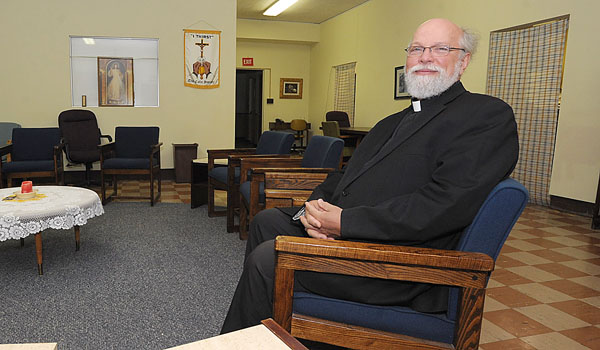National society offers spiritual hope for recovery to alcoholics
by KIMBERLEE SABSHIN
The Diocese of Buffalo offers spiritual hope and guidance from a religious perspective to Catholics who struggle with alcoholism.
The Calix Society, a group that ministers to recovering alcoholics, their family and friends, meets in the basement of the rectory at St. Michael Parish in Buffalo, at 3 p.m. on the fourth Sunday of every month. Its chaplain is Father Martin X. Moleski, SJ.
The Calix Society is intended to be a supplement to Alcoholics Anonymous, rather than a replacement, as it recognizes the 12-step program is generally recognized as the most effective means for people to stay sober. Calix has an international presence with local societies in 18 states, the United Kingdom and Ireland, intended to allow Catholics to share their faith with others who are experiencing the same struggle.
"I've been interested in helping alcoholics to recover - and not just alcoholics, but alcoholics and family members - to recover from the problems of alcoholism for over 30 years," Father Moleski said.
In AA, there are 12 steps, 12 traditions and 12 concepts of service. Father Moleski said Calix believes in all of these steps, traditions and concepts, but adds discussion about the nature of God and faith. The structure of a Calix Society meeting is, otherwise, very similar to that of a typical AA meeting.
"You could call Calix a subset of Alcoholics Anonymous," Father Moleski said. "In Alcoholics Anonymous, the brilliant tradition is everybody gets to choose the god of his or her own understanding. In Calix, we all agree that our understanding of God comes from the teaching of the Catholic Church, so we share in the belief of the Trinity, incarnation, atonement, the life of the sacraments and the spirituality of the Catholic Church. We encourage each other to participate fully in the life of the Church."
Before Father Moleski, Father Richard J. Hoar, SJ, who now lives in the Bronx, took over the group after Father James J. Ruddick, SJ, died in 2007. The society's name is the Latin word for "cup" or "chalice." Its motto, "substituting the cup that stupefies with the one that sanctifies," uses Catholic imagery.
Members of the Calix Society encourage others to pray, participate in their home parishes and make use of the sacraments, particularly reconciliation, Communion and anointing of the sick when appropriate, as well as devotion to Mary and their preferred saints. By serving as the society's chaplain, Father Moleski is able to learn a great deal about the role of spirituality as he helps others with their illness.
"I've learned how beautiful recovery is when we share a common spirituality," he said. "It takes away some of the friction that is found in an ordinary AA meeting between different concepts of God. Because everybody is properly allowed to have their own concept of God, many of the sharings may not be that edifying, from the Catholic standpoint, and there are things with which we disagree spiritually or theologically."
Many people who attend AA meetings identify themselves as "spiritual, not religious," and this is considered fine from the AA standpoint since no attempts are made to change people's views on faith. However, from the Catholic standpoint, this is a problem because it "really cuts us off from what God has given us in the Catholic tradition," Father Moleski said.
"We can share freely about what we have received from the tradition, and know that everybody at the meeting has agreed beforehand that this is an appropriate thing to share," Father Moleski said. "This kind of sharing, in an open AA meeting, would be liable to lead to arguments and offend people who are trying to recover from alcoholism who are not Catholic, and who have a legitimate freedom not to be Catholic."
The meetings are open to non-Catholics as well, provided they understand that the discussions will be largely guided by talk about the faith. As is typical with AA meetings, members may either introduce themselves to others in the group by their real first name or an alias, and Calix never publishes directories or otherwise reveals the identities of those who attend meetings to outsiders.
"All are welcome. Anybody who is directly an alcoholic, or who loves an alcoholic, is welcome to come to the meetings," Father Moleski said.
For more information call Father Moleski at 716-888-2383 or visit www.calixsociety.org.




